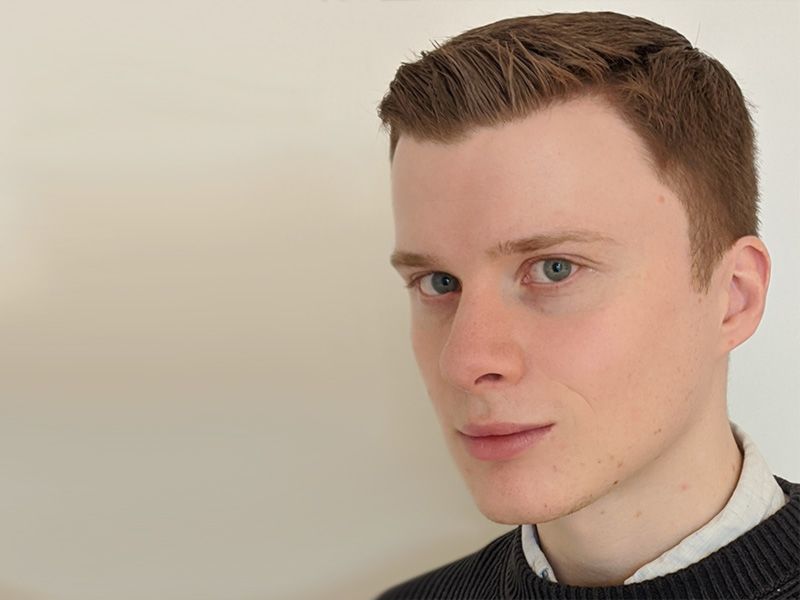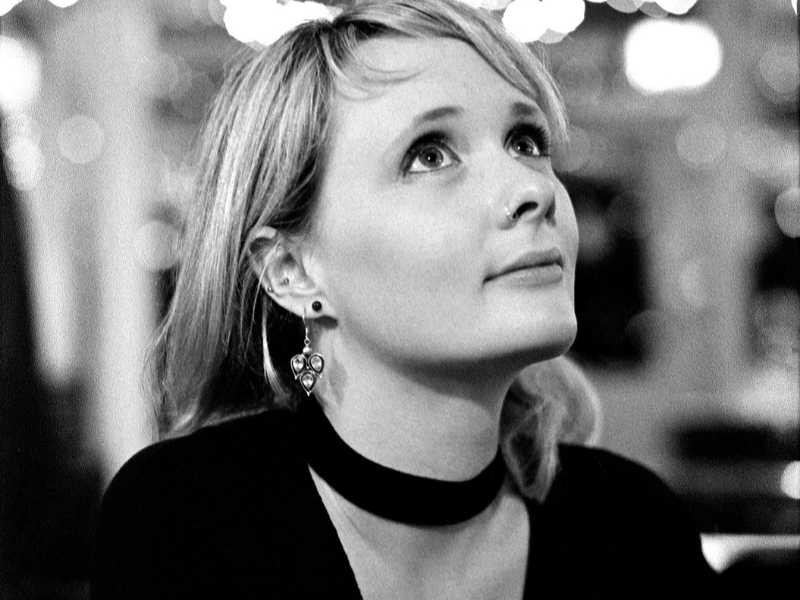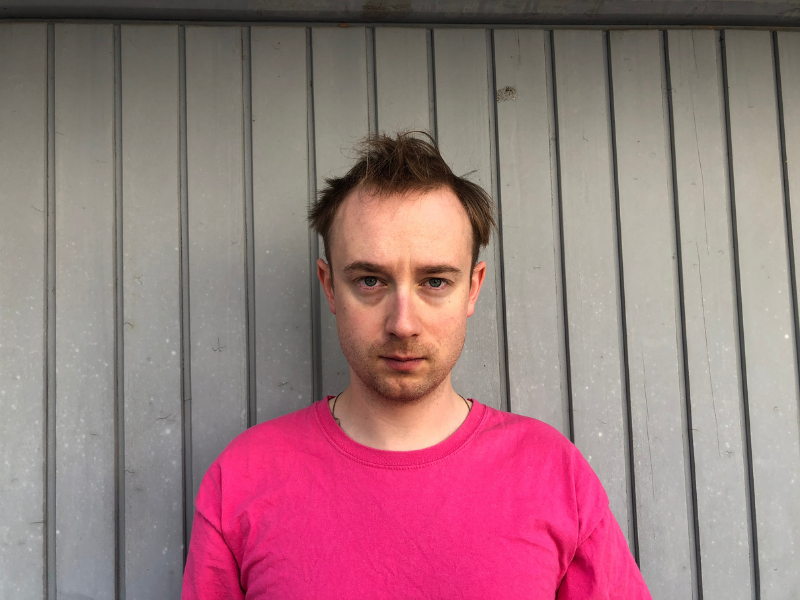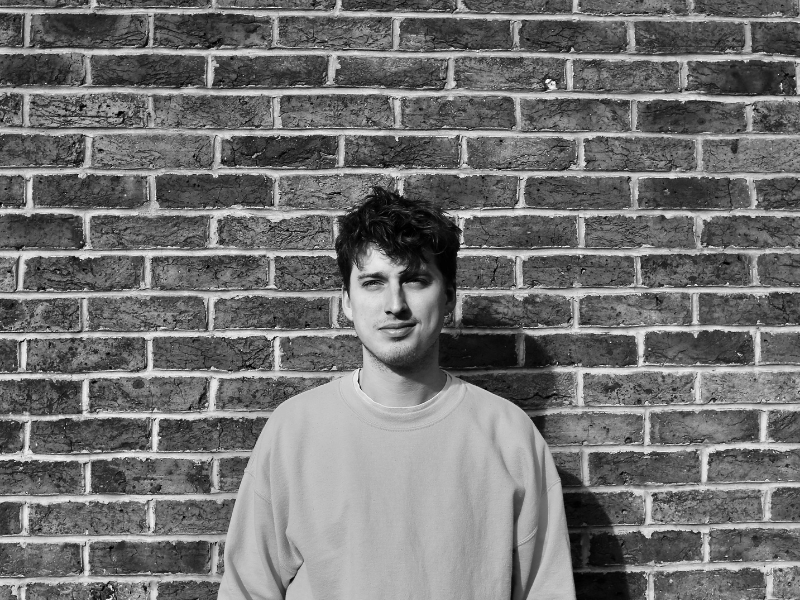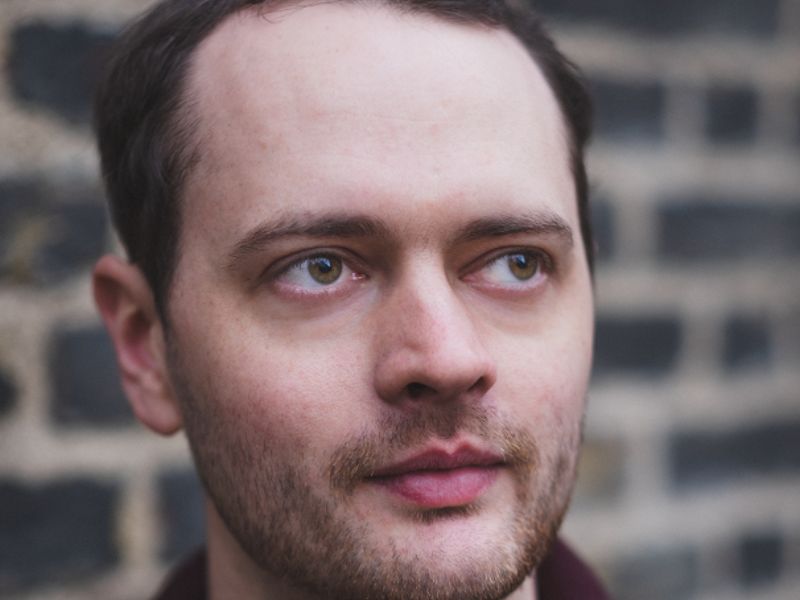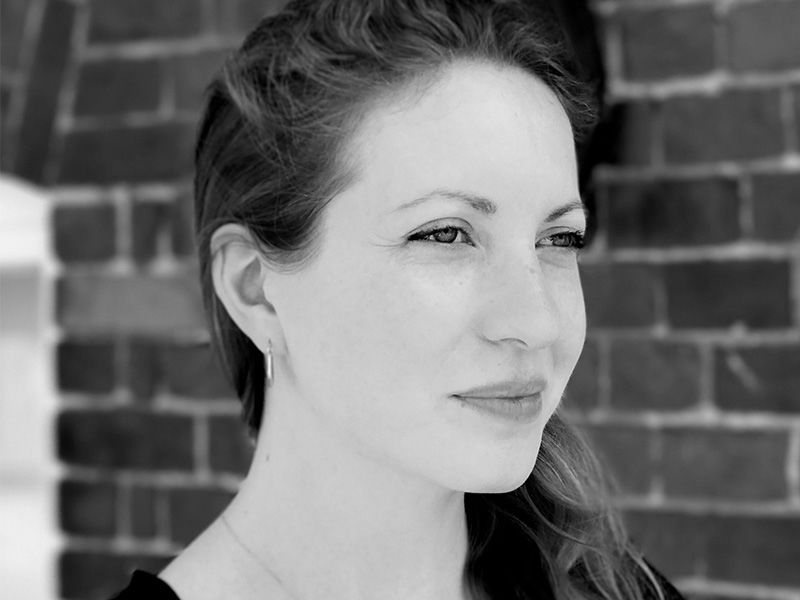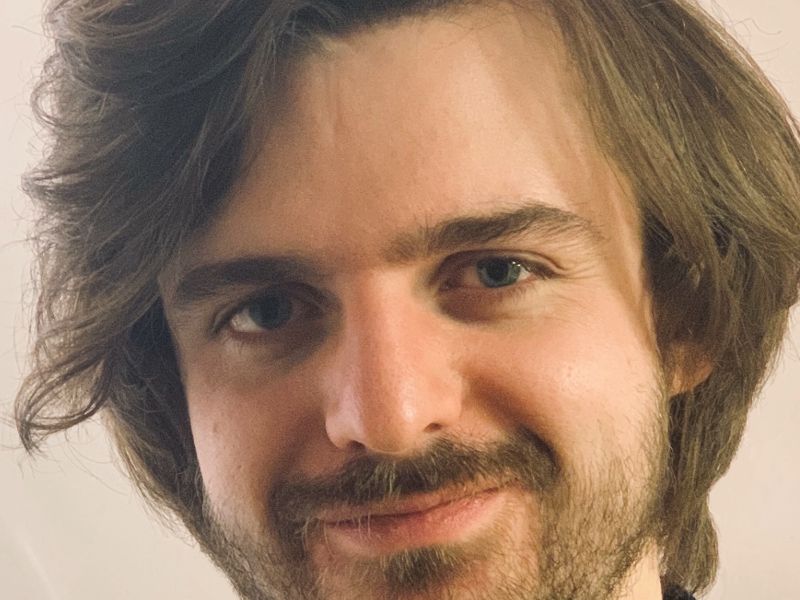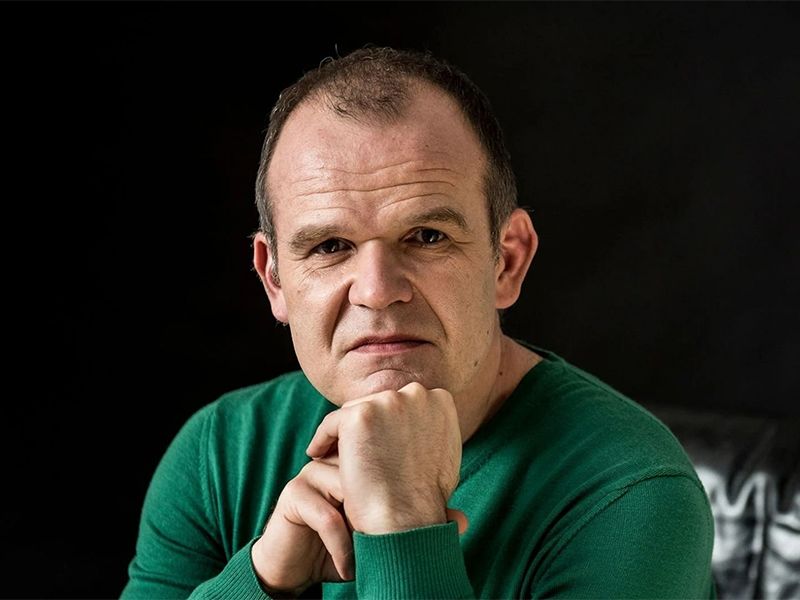LSO Panufnik Composers Workshops
Thursday 31 March 2022
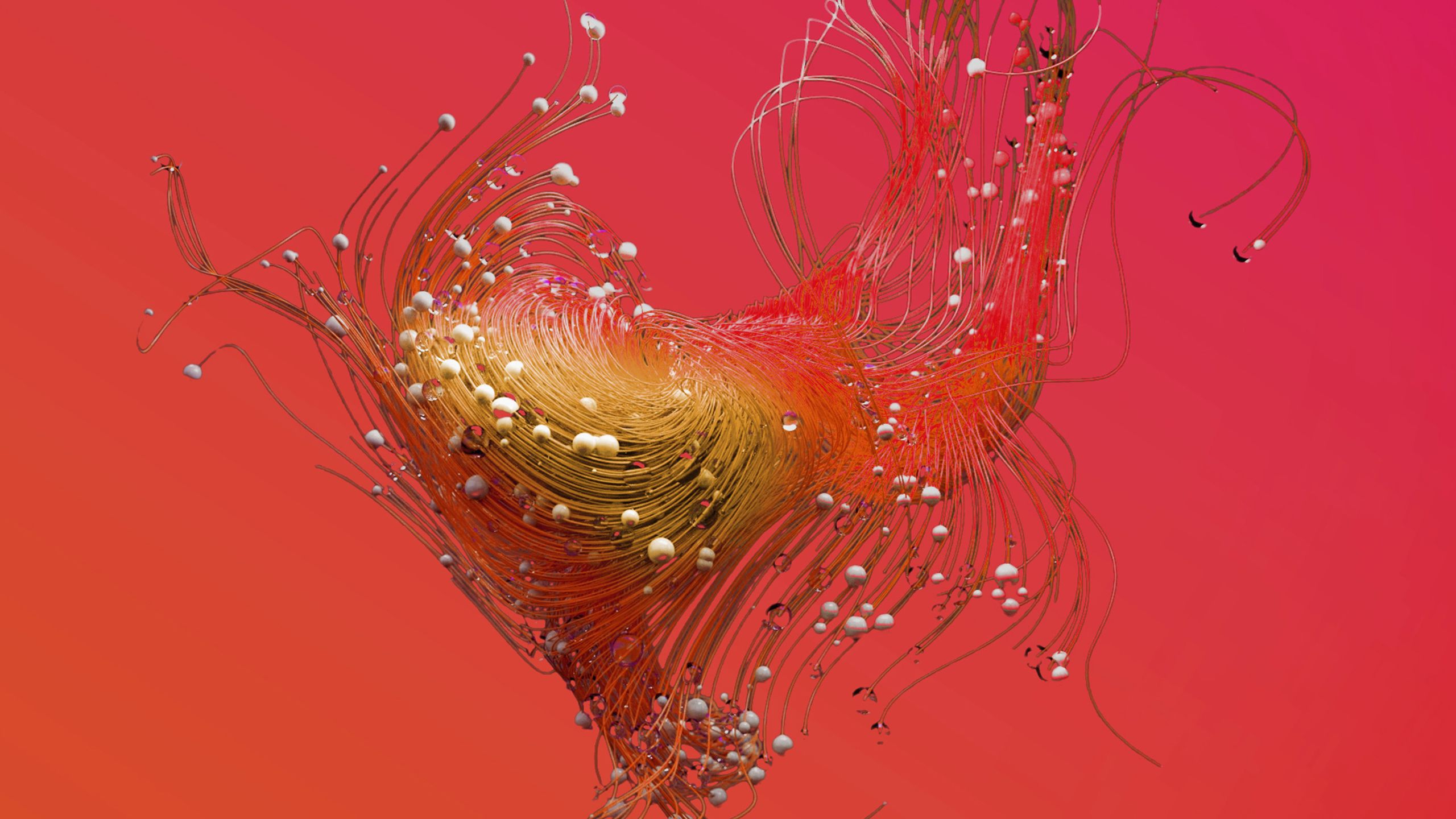
Welcome
Thank you for joining us for today’s workshops, where we will hear six three-minute pieces for orchestra, developed by composers who were appointed to the LSO Panufnik Composers Scheme in 2020. We also hear the latest work from Jonathan Woolgar and Louise Drewett, who, following last year's workshops, were commissioned to complete a five- and ten-minute piece respectively for performance in the LSO’s 2022/23 Barbican season.
The experience of hearing a new work performed for the first time is a pivotal point in the composition process, and it is always a great joy to explore the diverse works created by our composers, and to share that moment with an audience.
Today's workshops are conducted by François-Xavier Roth, Principal Guest Conductor, who has been identified with this programme from the outset, and who has made such a great contribution to the development of the Scheme.
Our sincere thanks to Lady Hamlyn and The Helen Hamlyn Trust for their inspirational, long-term support of the LSO Panufnik Composers Scheme, creating the conditions in which the creative process can flourish, to Colin Matthews and Christian Mason in their roles of Composition Director and Composition Support, and to Lady Camilla Panufnik, for her commitment to the whole initiative. We were delighted last month to also welcome Errollyn Wallen, who has joined the Scheme to provide invaluable compositional support from 2022/23.
I hope you enjoy the workshops, and that you can join us again at LSO St Luke’s or the Orchestra's Barbican home soon. On Sunday François-Xavier Roth conducts the LSO Futures concert at the Barbican, also generously supported by The Helen Hamlyn Trust. We will hear the world premiere of Joel Järventausta's Sunfall, commissioned through the LSO Panufnik Composers Scheme in 2019, alongside the world premiere of Helen Grime's Trumpet Concerto for Håkan Hardenberger, and the UK premiere of the Violin Concerto for Patricia Kopatchinskaja by Francisco Coll, an alumnus of the Scheme in 2009/10.

Kathryn McDowell CBE DL; Managing Director
Kathryn McDowell CBE DL; Managing Director
Thursday 31 March 2022
Today's Sessions
10am–1.30pm
Jonathan Woolgar Symphonic Message: "Wach auf!"
Stef Conner The Rot and the Shimmering Moss
Alex Paxton Love you's bus-eyed
Christian Drew Double Chorus
2.30–6pm
Emma-Kate Matthews A Study of Passing Objects In An Accelerating Landscape
Patrick John Jones Song of a Red Sprite
Louise Drewett The Daymark
Chris McCormack fold filament arc echo
François-Xavier Roth conductor
London Symphony Orchestra
Colin Matthews composition director
Christian Mason composition support
About the Scheme
The Panufnik Composers Scheme offers six emerging composers each year the opportunity to write for a world-class symphony orchestra.
The scheme is guided by renowned composer Colin Matthews, with support from Christian Mason and, new for the 2022/23 Scheme, Errollyn Wallen. Together with additional tailored support, the scheme enables composers to experiment with and develop their orchestral writing skills through creating a three-minute composition over twelve months.
The resulting compositions are performed and discussed by the LSO and Principal Guest Conductor, François-Xavier Roth, in a public workshop rehearsal at the culmination of the scheme.
Two of the compositions are then chosen to be developed further, before being premiered by the Orchestra in an LSO concert at the Barbican.
The LSO Panufnik Composers Scheme was devised by the Orchestra in association with Lady Panufnik, in memory of her late husband, the composer Sir Andrzej Panufnik, and is generously supported by Lady Hamlyn and The Helen Hamlyn Trust.

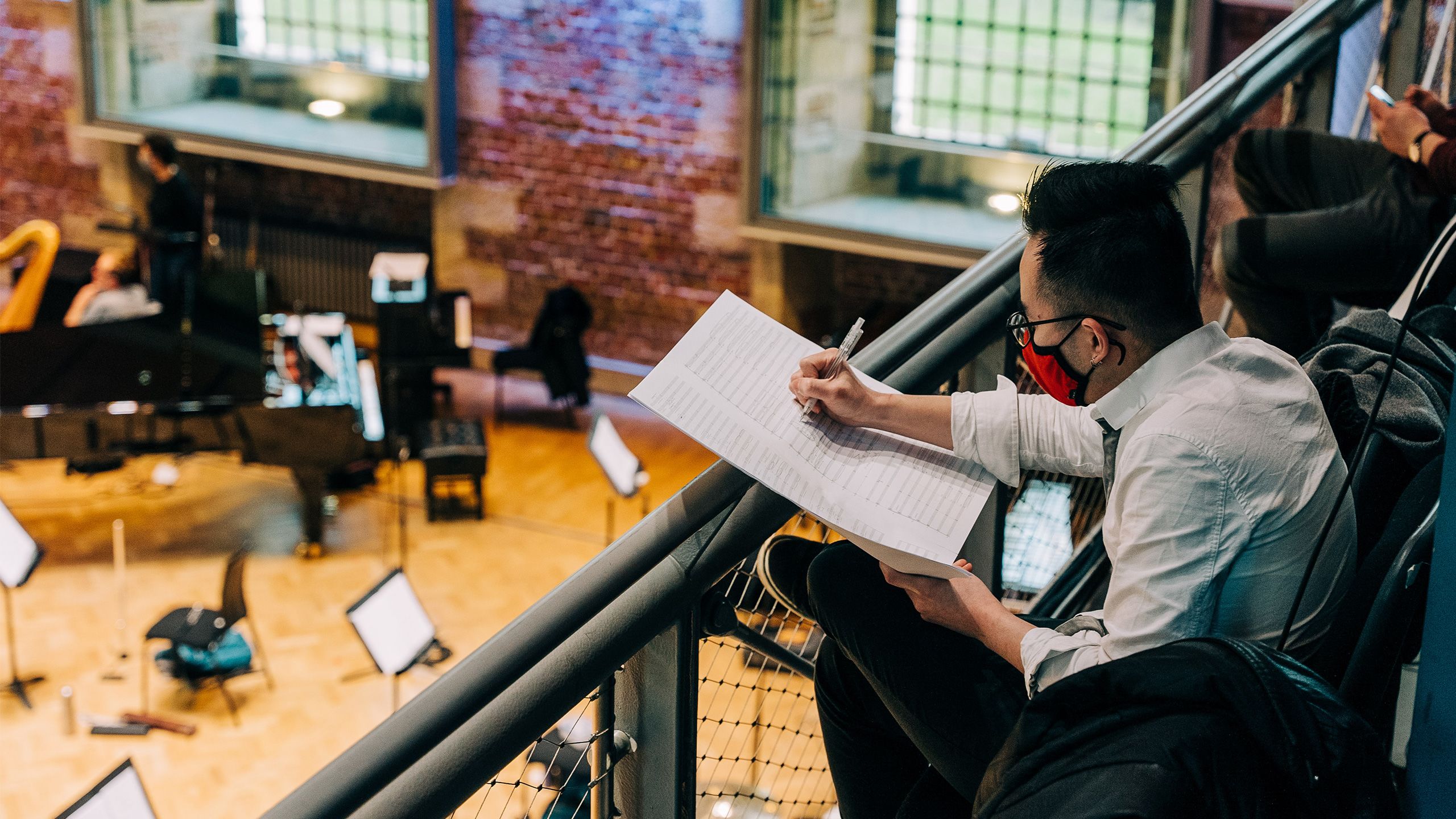
Jonathan Woolgar
Symphonic Message: "Wach auf!"
Five-minute commission, 2019/20 cohort
As a participant in the LSO Panufnik Composers Scheme two years ago, Jonathan Woolgar wrote a short Proto-Symphony. Compressing the spirit of a grand symphony into just three minutes, it was made of possible beginnings without further development: a symphonic logic, but without the symphony itself; a shadow-play of a grand narrative.
Symphonic Message: "Wach auf!" is similarly inspired by aspects of the Austro-German symphony, reduced down to their essences and reconfigured into the smallest possible space. The subtitle refers to the last scene of Richard Wagner’s opera Die Meistersinger von Nürnberg and the chorus of praise sung upon the entrance of the beloved mastersinger, Hans Sachs. Jonathan borrows only Wagner’s blazing G major chord (sung on ‘auf’) but it is sufficient to start a symphonic process in miniature.
In a sense, the strident opening was too much too soon, and the next five minutes of Symphonic Message comprise attempts to rebuild that momentum: having woken up, the orchestra is forced to decide what it wants to do. As in Proto-Symphony the argument is built up out of false starts – phrases that swell in volume before tailing off, as though trying and failing to begin a conversation. Slow movements, fast movements, a recitative, a march: all are attempted. Only at the end, as some sort of calm is restored, does it become clear that the hairpin contrasts and sudden changes in manner weren’t missteps at all, they were the journey itself.

Jonathan Woolgar
Jonathan Woolgar draws from a wide range of musical experience to create work that is communicative without compromise. His music explores the lines between musical eloquence and ineloquence, and between the fragmentary and the symphonic, with a focus on the physical, human dimensions of live performance on acoustic instruments.
Jonathan has recently been commissioned by Héloïse Werner, Patrick Bailey and the Royal Philharmonic Society (as an RPS Composer 2020/21), and his music has been performed at the Wigmore Hall, Royal Albert Hall and Basilica San Marco, Venice by performers such as 12 Ensemble, Manchester Camerata and the London Symphony Orchestra, as well as in Armenia, Sweden, New Zealand and several times on BBC Radio 3. Other recent projects include taking part in the LSO’s Panufnik Scheme, a commission for the Royal Academy of Music’s 200 Pieces project, and a premiere at the 2021 Cheltenham Music Festival. He is currently working on two new orchestral works to be premiered in the 2022/23 season.
Whilst currently based in London, Jonathan originally hails from Pontefract in West Yorkshire. He won a scholarship to attend Chetham’s School of Music, Manchester as a sixth-former, studying composition with Jeremy Pike and Gavin Wayte. He then read music at Fitzwilliam College, Cambridge where he was taught by Giles Swayne, before going on to study with David Sawer, Peter Maxwell Davies and Oliver Knussen at the Royal Academy of Music. He has recently completed a PhD, supervised by Julian Anderson, at the Guildhall School of Music & Drama, and has an active teaching career.
Stef Conner
The Rot and the Shimmering Moss
The general atmosphere of Stef Conner’s The Rot and the Shimmering Moss may be interpreted from the evocative expression markings of its score, which intensify from ‘prickly’ and ‘sludgy’ to ‘creeping entropy’ and ‘the world is melting’. We are in a disquieting narrative, populated by ‘heavy industrial hell-machines’ and ‘pockets of unrest’: the rot of the work’s title seems as much social and political as natural and fungal.
As a composer and singer, Stef is known for her reconstructions of ancient musics and instruments. But although there is a medieval slant to the melody that emerges, ‘grinding’, out of the mouth of the hell-machine, this is not a vision of folkish pastorale, nor even a religious meditation, but a nightmarish amalgam of the ancient and the technologically advanced. The music begins with the disturbing gesture of a ‘Mexican wave’ of spiders’ footsteps in the form of a random col legno tapping of the back of the bow on the strings, that passes instrument by instrument across the entire string section. The prickling soundworld is sustained by a coarse percussion complement of cymbals, drums, whip brake drum and sleigh bells. Only with the last two bars – an abrupt series of timpani and double bass strikes marked ‘night terror’ – is the bad dream brought to a sudden, wakeful end.

Stef Conner
Stef Conner is a composer and singer who makes work based on evidence from deep history. She is equally at home in the classical and traditional music worlds. From 2008 to 2010, and in 2018, she performed with the Mercury Prize-nominated folk band The Unthanks, whose honest mode of musical storytelling ignited an enduring passion for traditional song. She currently performs with Kathryn Tickell and The Darkening, in a programme inspired by ‘the wild, dramatic, weather-bitten countryside along Hadrian’s Wall’.
Since 2019 she has performed as a soloist with Sequentia Ensemble for Medieval Music, directed by Benjamin Bagby, in a programme inspired by Old English and Norse poetry, Words of Power, and a current production of the Roman de Fauvel, directed by Peter Sellars, at the Théâtre du Châtelet, Paris. In 2012 she released The Flood with the Lyre Ensemble, an album of ancient Mesopotamian poetry set to new music, accompanied by reconstructed Sumerian lyres, garnering surprise international attention, including features in Newsweek, New Scientist, The Guardian, and The Arts Show with Jonathan Ross. From 2013 to 2015, she was the first Composer in Residence with the charity Streetwise Opera, which uses music to help homeless people make positive changes in their lives. This collaboration led to her being named in the Evening Standard's 2014 '1000 Most Influential Londoners' list.
Her album Riddle Songs (Delphian), based on Old English riddles (‘an appealingly imaginative listening experience’, Gramophone, March 2021), was a Presto Editor’s Choice and finalist for the 2020 Recordings of the Year.
Alex Paxton
Love you's bus-eyed
Love You’s Bus-eyed is the title of an improvised painting by Alex Paxton. Lurid with colour, texture and cartoon imagery, it appears to be about the size of an A5 notebook but is packed (on the plane of the painting, and in layers on top of it) with stickers, craft materials (feathers, glitter, coloured powders), googly eyes and even miniature figurines, face down in the mess. As well as the eyes, among many other things, it’s possible to make out the outline of a bus, and an ‘I ❤️ YOU’ sticker. The syntactic peculiarity of the painting’s title derives from its calculated refusal to respect the norms of propriety (or grammar) in favour of technicolour, and occasionally tender, collisions.

Love You's Bus-eyed improvised painting
Love You's Bus-eyed improvised painting
Listening to Alex's orchestral piece of the same name is to hear the same approach: shades from Handelian fanfare to Hollywood glitz to 8-bit chiptunes are pressed into one another, smeared with woozy glissandos or trilling distortions. Trumpets play through kazoos; the percussionist whistles ‘like a bat trying to get out of a tumble dryer’. Layers are spilled upon layers in an improvisational frenzy like that of the painting. ‘Writing this short orchestral piece was a gushing-urge kind of feeling. I remember wanting to get it down quite quick and desperately’, says Alex. Infused with junk and joy the result is a glorious, chaotic song of modern love.

Alex Paxton
Alex Paxton is a composer and improvising-trombonist based in the UK. 'A riotous overabundance of love and rage … an extraordinary experience' (The Wire). He was elected to the Ninth International Composition Seminar with Ensemble Modern, won an Ivor Novello Award (multiple other nominations), RPS Composition Prize, Dankworth Jazz Prize, Leverhume Art Prize, Harriet Cohen Award, as well as represented in the Orchestral section of the ISCM. His albums to date include MUSIC for BOSCH PEOPLE released to critical acclaim in 2021. Upcoming releases include HAPPY MUSIC for ORCHESTRA & ILOLLI-POP. He has made releases with Birmingham Record Company, NMC, Delphian, Non-classical, Listen Pony and Everest records. 'This is the most joyous sound I’ve heard in ages!' (New York Times)
He has performed his music as a soloist with leading orchestras: Ensemble Modern, London Sinfonietta, Philharmonia Orchestra , Royal National Scottish Orchestra and Ensemble x.y. Further works and commissions include pieces for AskSchöenberg, Riot Ensemble, Nouvel Ensemble Contemporain, Wigmore Hall, Explore ensemble, London Philharmonic Orchestra, Kammer Klang, BSO, Psappa, NYJO. 'Paxton is a system-crasher of genre, stylish wit and sophistication and extremely entertaining … virtuouso ad absurdum.' Musikderzeit Schott. Music theatre works include six operas hosted by English National Opera, Helios Colective, Tête à Tête Festival. 'Highly innovative ... of exceptional creative imagination and musical energy, packed with life force unlike anything else.' Ivor Novello Composer Awards Winner.
Christian Drew
Double Chorus
That strange sound effect you can hear at the start of Christian Drew’s Double Chorus, played first by clarinet and alto flute, but soon spreading across the whole woodwind section, is a timbral trill: a trill between different fingerings of the same note to create an unstable fluttering pitch that is fixed, but has an inner life of its own. Combined with the use of wah-wah mutes in the brass, and slow vibrato glissandos in the strings, it contributes to an uncannily destabilised orchestral sound that persists to varying degrees throughout Christian's piece. Of the two choruses of his title, one sounds distinctly inebriated – the music is marked ‘wavy, woozy’, and later, in case of doubt, ‘still woozy’.
There are clues at the beginning, however, to a second, more poised kind of music. It begins as percussive chimes – vibraphone, glockenspiel, celesta, as well as pizzicato (plucked) strings – whose resonances fade into the hazy textures of the rest of the orchestra. But soon they transition into florid melodies, ornamental and sure of themselves, first played sotto voce (literally 'under the voice') and then with increasing certainty. Through the middle section of the work, it is this second chorus that has its hands on the wheel. But inevitably it too succumbs, and the piece concludes with an evaporation into fogs of glissandos and clouds of detached staccato droplets.

Christian Drew
Christian Drew is a composer and performer based in London. He makes music for concerts, installation, dance, film and media using acoustic instruments, electronics and recordings. His music ranges from works that draw on source materials from baroque, medieval, shoegaze, ambient or folk music, to loose and flexible pieces that use open scoring to invite many possible outcomes.
Recent works have been composed for London Symphony Orchestra players, Plus Minus Ensemble, EXAUDI Vocal Ensemble, Juice Vocal Ensemble, What Guitar Trio, Kreutzer Quartet, OUT-TAKE Ensemble, lutenist Elizabeth Kenny and soprano Juliet Fraser, and performed at the Wigmore Hall, The Place Theatre, IKLECTIK, the National Centre for Early Music, 840 Series, Cheltenham Music Festival and the Richmond Concert Society. Currently he is a participant on Psappha’s Composing For Piano 2022.
Christian graduated with a Master of Composition with Distinction from the Guildhall School of Music and Drama, where he studied as a Leverhulme Arts Scholar with Laurence Crane and Richard Baker. Here he received the Mary Ryan Composition Award and the Rose Lawrence Horners’ Award, the Guildhall School’s academic prize.
He completed his undergraduate degree at the University of Southampton, studying with Matthew Shlomowitz, Benjamin Oliver and Michael Finnissy. Upon graduation he received the Hazel Muras-Osborn Composition Prize, the Lyttel Prize for academic achievement and the Edward Wood Memorial Prize for the best student graduating in music. He was also Assistant Conductor of the Southampton University Symphony Orchestra.
As a multi-instrumentalist Christian has performed with a range of bands and experimental projects on fretted instruments, accordion and voice. He currently teaches guitar and music theory privately and in schools across the South East.
Emma-Kate Matthews
A Study of Passing Objects In An Accelerating Landscape
Few inventions of the modern era did more to reshape our experience of time and space than train travel. Not only in our imagination of countries and continents (think of the transformations made possible by the European, North American or Trans-Siberian rail networks), but in our direct experience as train passengers. Viewed from the window of a moving train, a static, once painterly landscape is animated into layers of interlocking activity whose speed of movement is connected to their distance from us. The usual visual order of perspective is inverted as distant objects become legible in their stillness while close ones become blurred by speed. Static, trackside objects change continually in appearance as we rush by.
In her piece, Emma-Kate Matthews offers musical analogues for these visual phenomena. Her work begins with a glimpse of that static landscape, represented by a quick cross-section of the music that is to come. And then the train gets underway. We hear doppler-like effects of objects approaching (rising in pitch) and receding (descending), staggered entries of foreground and background, and a gradual smearing of surface detail and harmonic complexity as the music accelerates until only a two-note drone – the distant, unmoving horizon – remains.

Emma-Kate Matthews
Emma-Kate Matthews (born 1986) is an architect, composer, musician and researcher at UCL. Her work explores creative reciprocities between music; as constructed sound, and architecture; as constructed space, through the composition and performance of site-specific and spatialised projects. In addition to composing on the LSO Panufnik Composers Scheme, her work has been performed internationally at acoustically distinctive sites such as the Sagrada Familia in Barcelona, London’s Southbank Centre and the Barbican Centre lobby.
She has released a number of solo electronic-classical fusion works including ‘Similis’ on Musicity Global (2019) ‘Far Flung’ on Algebra Records (2020), and ‘Remote Overlap’ on NMC Records (2021). In addition to being a multi-instrumentalist, she also designs and makes her own sonic instruments: In 2021, she was nominated for the Lumen prize for Art and Technology for her project ‘Resonant Bodies’.
Her work has been exhibited at the Royal Academy of Arts and the Royal Institute of British Architects and her written works have been published in journals including Architectural Design (Wiley) and Organised Sound (Cambridge University Press).
In 2019, Emma-Kate organised and presented at the ‘Sound of Space Symposium’ funded by the Australian Research Council. Throughout 2022, she is working in collaboration with _Underscore on a site-specific opera for Birmingham’s Moseley Road Edwardian bath house. She will also compose a site-specific piece for the ‘Witness Stand’ project at Brighton Festival, and she will exhibit and perform new site-specific works at the Works + Words exhibition in Copenhagen in November.
Patrick John Jones
Song of a Red Sprite
A red sprite is a rare optical phenomenon of the upper atmosphere associated with thunderstorms. Alien in appearance, red sprites are the product of lightning-like electrical discharges and appear in flashes up to 50 miles above the earth in the startling forms of glowing crimson jellyfish or jagged, branching figures. Although something like them has been reported for centuries, sprites were only formally discovered in 1989. They have since been observed many times, from the ground, from aeroplanes and from the International Space Station.

Source: earthsky.org © Stephen Hummel
Source: earthsky.org © Stephen Hummel
Appropriately for their ethereal, supernatural appearance, sprites are named after the elf-like creatures of European mythology (such as Ariel or Puck), and in his Song of a Red Sprite, Patrick John Jones gives voice to the atmospheric sprite who hovers in the sky, materialising occasionally to survey (or create?) the storms below. The work begins ‘nocturnal with thick air and electrical crackle’ as clouds of string and wind air sounds billow around a portentously descending chromatic bassline. Cutting across this thunderhead are jagged, pointillistic countermelodies, an irregular rhythmic ostinato and atmospheric shivers and sizzles. As these move around at unexpected speeds and across a wide instrumental palette the sprite may be heard to flash and flicker in hidden corners of the orchestra’s sonority.

Patrick John Jones
Patrick John Jones was born in London in 1989. His work has been described as ‘strange, eerie … expressive’ (Britten Sinfonia Blog), ‘assured … compelling’ (Bachtrack), ‘acerbic’ (The Guardian) and ‘remarkably fresh’ (The Philharmonia Blog). It has been performed by many leading artists and ensembles, including the Britten Sinfonia, Ensemble 10/10, the Philharmonia Orchestra, Quatuor Diotima, Mahan Esfahani, The Kreutzer Quartet, Octandre, Psappha, the Tritium Trio, the Berkeley Ensemble, and the Ulysses Ensemble. He was a joint winner of the Calefax Composers Competition 2020, and received the RPS Composition Prize in 2015 and the Britten Sinfonia’s OPUS award in 2014.
Patrick is currently a Leverhulme Early Career Fellow at the Guildhall School of Music & Drama. He was an artist-in-residence at the The John Rylands Research Institute from November 2019 to February 2020, and completed a PhD in Composition from 2013 to 2017 at the University of York, supervised by Dr Thomas Simaku. Prior to this, he received an MMus in composition from Kings College London and a BA (Hons) in Music from the University of York. He has taken part in a number of courses and summer schools for emerging composers, including the advanced composition course at Dartington Summer School (2019), taught by Harrison Birtwistle, the Britten-Pears Composition Course (2017), taught by Oliver Knussen, Colin Matthews, and Michael Gandolfi, and the Philharmonia Academy (2015/16), mentored by Unsuk Chin.
Louise Drewett
The Daymark
Ten-minute commission, 2019/20 cohort
The starting materials of Louise Drewett’s The Daymark are outwardly simple: a seven-note descending scale in D major, played initially by a trio of bassoons. Yet what Louise does is deceptively complicated. For one thing, the bassoons do not play quite the same thing: they follow the same pitch patterns, but rhythmically out of sync with each other. The same idea is picked up by three clarinets a few bars later, and then in various forms throughout the piece. Meanwhile, slower chords in the strings and horns, and splashes from the percussion and harp pick out fragments of the same scales and turn them into independent instrumental layers. The effect is something like the refraction of light as it hits a prism and is split into different speeds and colours. As the piece progresses, the different layers draw together even as they peel apart, pulling the music through a series of luminous climaxes and changes of texture.
The work began as a three-minute miniature for the LSO Panufnik Composers Scheme in 2020. This, it transpires was just a first movement, to which Drewett has added a spirited second, similarly kaleidoscopic but now made up of curling scales and snapping, two-note fragments.
The Daymark itself is an octagonal stone beacon built in 1864 on the Devon coast as an aid for finding Dartmouth harbour from the sea. Standing on eight long arched legs it resembles an octopus, swimming upwards, or an arcane spaceship. At 24 metres tall, it works by dint of size alone, yet its octagonal shape means that it always reflects the light in interesting ways, and as the sun sets it can be glimpsed as a point of light between its arches.


Louise Drewett
Louise Drewett (born 1989) is a British composer. She co-directs Sing Healthy Choirs, a charity running community choirs in Berkshire, and writes and arranges many pieces for them. Louise has had long-term collaborations with poet Clare Shaw, writing works for voices and choirs, and with theatre company Arbonauts, writing for productions at Inside Out Dorset and Latitude festivals. Louise's recent projects include new works for Festival Chorus, EXAUDI, the International Guitar Foundation, and a community opera, Daylighting, commissioned for the Royal Academy of Music's 200th Anniversary.
Louise is currently Manson Fellow at the Royal Academy of Music, where she is studying on a scholarship with Philip Cashian towards a PhD in composition. She gained an MMus with Distinction at the Academy in 2018, supported by the Countess of Munster Musical Trust and a Vaughan Williams Bursary from the RVW Trust, and was awarded the 2018 and 2019 Charles Lucas Composition Prizes.
Chris McCormack
fold filament arc echo
In the literary style of magic realism – exemplified in the novels of Gabriel García Márquez, Isabel Allende and Jorge Luis Borges, among others – fantastical and realistic worlds are brought into conjunction and allowed to invade, infect, transform and accent each other without contradiction. Families are populated with ghosts and mythological transfigurations, dreams and prophecies become real, and time and landscapes are distorted.
Inspired by such fruitful juxtapositions, Chris McCormack combines in his fold filament arc echo contrasting musical elements: hushed, imperceptibly changing chords; a bright, threaded polyphony of piano and vibraphone; and gently resonating pulsations. Over the course of his work’s three-minute duration Chris allows these opposing materials to interact and comingle. And so the vibraphone’s melodic leaps become fragment into ornamental flourishes to held wind notes. Elsewhere, static harmonies are teased out into dynamic textures – or are pulses lengthened into held chords? Slowed down and harmonically warped, the piano’s sparkling liquidity becomes a thick flow of strings. Music is not strictly realistic so it cannot be magic realistic, but in Chris’ piece, as folds become echoes and filaments become arcs, what we first heard as the sure substance of the work becomes indistinguishable from the fantasies played upon it.

Chris McCormack
Chris McCormack (born 1992), is an Irish composer, based in London. His work has been performed internationally, by Crash Ensemble, players of the London Symphony Orchestra, Plus Minus Ensemble, EXAUDI, Liam Byrne, Ensemble Adesso and others. Recent engagements include the release of a chamber work, Silver Traces, on NMC, a commission by the Irish National Concert Hall and Crash Ensemble for the New Music Dublin festival 2019, and a long-form work for the pianist Andrew Zolinsky.
Chris studied composition with Dr Richard Baker at the Guildhall School of Music and Drama, on scholarships from the Ralph Vaughan Williams Trust and the Guildhall School Trust, and at Trinity College, Dublin with Dr Donnacha Dennehy and Dr. Evangelia Rigaki.
Chris is currently undertaking a doctorate in Composition at the Guildhall School of Music and Drama, studying with Professor Julian Anderson CBE, Dr. Simon Emmerson, and Dr. Nye Parry, where his studies are supported by the Guildhall School Trust.
Artist Biographies

François-Xavier Roth
LSO Principal Guest Conductor
François-Xavier Roth is one of today’s most imaginative conductors and programmers, whether in his roles as General Music Director of the City of Cologne and founder of Les Siècles, or with the London Symphony Orchestra as Principal Guest Conductor. A born communicator, he is a charismatic and persuasive advocate for classical music of every description.
In Cologne, where he has directed both the Gürzenich Orchestra and the Opera since 2015, his programming is notable for its breadth and depth, including new commissions alongside Baroque and Romantic music. Roth upholds the orchestra’s pioneering heritage, which includes having given the world premieres of Mahler’s Third and Fifth Symphonies, Brahms' Double Concerto, Richard Strauss’ Don Quixote and Till Eulenspiegel, and Zimmermann’s Die Soldaten. For Cologne Opera he has led new productions of Berlioz's Benvenuto Cellini, Mozart's The Marriage of Figaro and Don Giovanni, Wagner's Tannhäuser and Tristan und Isolde, Humperdinck's Hansel and Gretel, Strauss' Salome and Gounod's Faust. In 2022, he will lead a new production of Berlioz's Béatrice et Bénédict.
He is a champion of new music and has premiered works by Georg-Friedrich Haas and Hèctor Parra, and collaborated with composers such as Pierre Boulez, Wolfgang Rihm, Jörg Widmann, Helmut Lachenmann and Philippe Manoury. Roth was joint winner
of the Donatella Flick LSO Conducting Competition in 2000, becoming Assistant Conductor with the LSO and working with the
Orchestra every year since.He has a leading role in the LSO Panufnik Composers Scheme, mentoring emerging composers.
Engagement with new audiences is an essential part of Roth’s work, whether speaking from the podium or working with young people and amateurs. With the Festival Berlioz and Les Siècles, he founded the Jeune Orchestre Européen Hector Berlioz, which has its own collection of period instruments and this year performs the second part of Les Troyens in Berlioz’s birthplace. In Cologne he has initiated a community orchestra and his Ohrenauf! youth programme was recipient of a Junge Ohren Produktion Award. His television series Presto! attracted weekly audiences of over three million.
London Symphony Orchestra
The London Symphony Orchestra was established in 1904, and is built on the belief that extraordinary music should be available to everyone, everywhere.
Through inspiring music, educational programmes and technological innovations, the LSO’s reach extends far beyond the concert hall.
Visit our website to find out more.

On Stage
Leader
Carmine Lauri
First Violins
Clare Duckworth
Maxine Kwok
Claire Parfitt
Laurent Quénelle
Harriet Rayfield
Sylvain Vasseur
Rebecca Dinning
Caroline Frenkel
Choi Haim
Gordon MacKay
Dániel Mészöly
Madeleine Pickering
Jan Regulski
Second Violins
David Alberman
Sarah Quinn
David Ballesteros
Matthew Gardner
Csilla Pogany
Belinda McFarlane
Iwona Muszynska
Andrew Pollock
Paul Robson
Lucy Jeal
Dmitry Khakhamov
James Wicks
Violas
Malcolm Johnston
Germán Clavijo
Julia O'Riordan
Sofia Silva Sousa
Robert Turner
Regina Beukes
Lisa Bucknell
Nancy Johnson
Claire Maynard
Anna Dorothea Vogel
Cellos
Adrian Bradbury
Alastair Blayden
Noël Bradshaw
Daniel Gardner
Anna Beryl
Thomas Isaac
Orlando Jopling
Jessie Ann Richardson
Double Basses
Patrick Laurence
Matthew Gibson
Joe Melvin
José Moreira
Paul Sherman
Simo Väisänen
Flutes
Ileana Ruhemann
Jack Welch
Piccolo
Rebecca Larsen
Oboes
Juliana Koch
Rosie Jenkins
Cor Anglais
Maxwell Spiers
Clarinets
James Gilbert
Sonia Sielaff
Bass Clarinet
Laurent Ben Slimane
Bassoons
Daniel Jemison
Joost Bosdijk
Contra Bassoon
Simon Estell
Horns
Timothy Jones
Andrew Budden
Zachary Hayward
David McQueen
Trumpets
James Fountain
Aaron Akugbo
Thomas Nielsen
Trombones
Isobel Daws
Merin Rhyd
Bass Trombone
Paul Milner
Tuba
David Kendall
Timpani
John Chimes
Percussion
Sam Walton
David Jackson
Harp
Daniel De-Fry
Piano
Elizabeth Burley
Meet the Members of the LSO on our website
Thank you for coming! We hope you enjoyed today's concert.
TWEET US
Tell us what you thought of the concert, share you pictures or ask us a question on Twitter by tagging us @londonsymphony, @lsostlukes or @lsocomposers.
Or find us on Instagram or Facebook.
Programme notes by Tim Rutherford-Johnson. Tim is author of Music after the Fall: Modern Composition and Culture since 1989 (University of California Press) and editor of the Oxford Dictionary of Music, sixth edition. He is currently writing a monograph on the music of Liza Lim for Wildbird Music, Australia, and co-authoring a history of music in the 20th century for Cambridge University Press.
Come and see us at the Barbican …
LSO FUTURES
Sunday 3 April, 7pm
A concert devoted to music that simply demands to be heard. François-Xavier Roth pairs three 21st-century premieres with Richard Strauss, in a concert devoted to musical innovators.
Music by Joel Järventausta opens the evening, with the world premiere of his 2019 LSO Panufnik Scheme commission, Sunfall. Plus Patricia Kopatchinskaja brings flair and theatrics to the UK premiere of the Violin Concerto by Francisco Coll (LSO Panufnik Composer 2009/10), and trumpet legend Håkan Hardenberger premieres a new concerto by Helen Grime.
Get 30% off any priced ticket for LSO Futures!
Apply the promo code 310303 at checkout to redeem.

